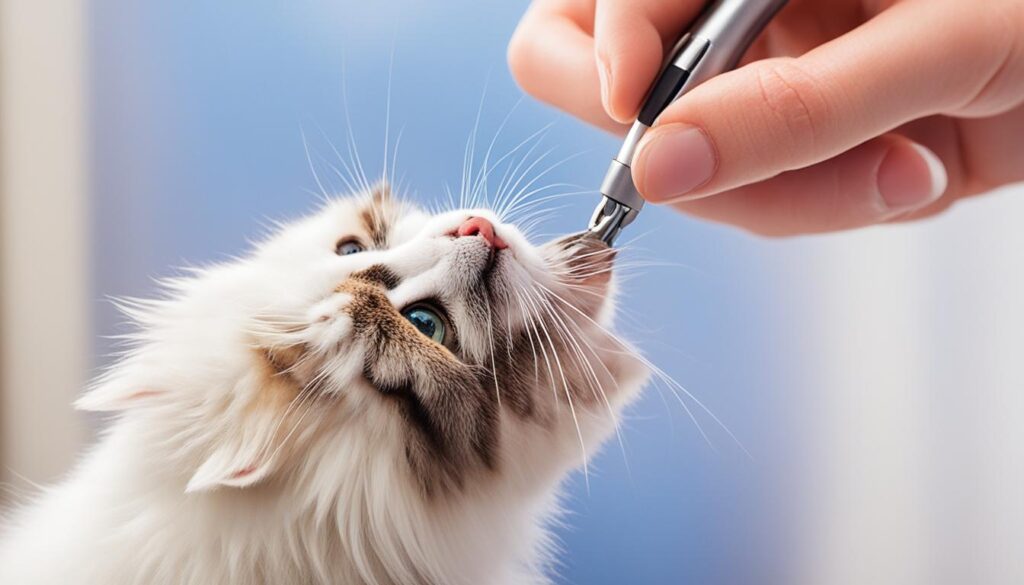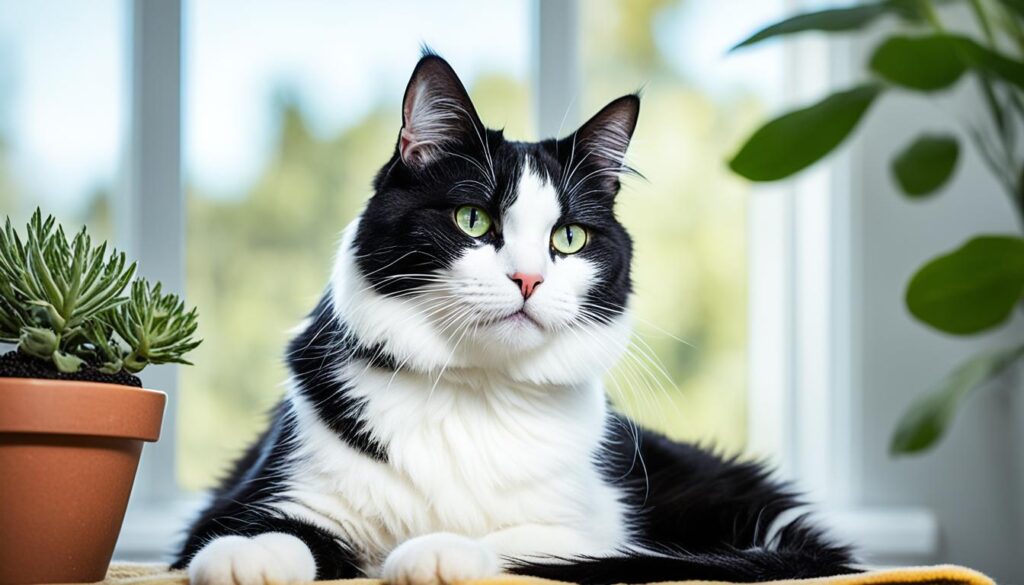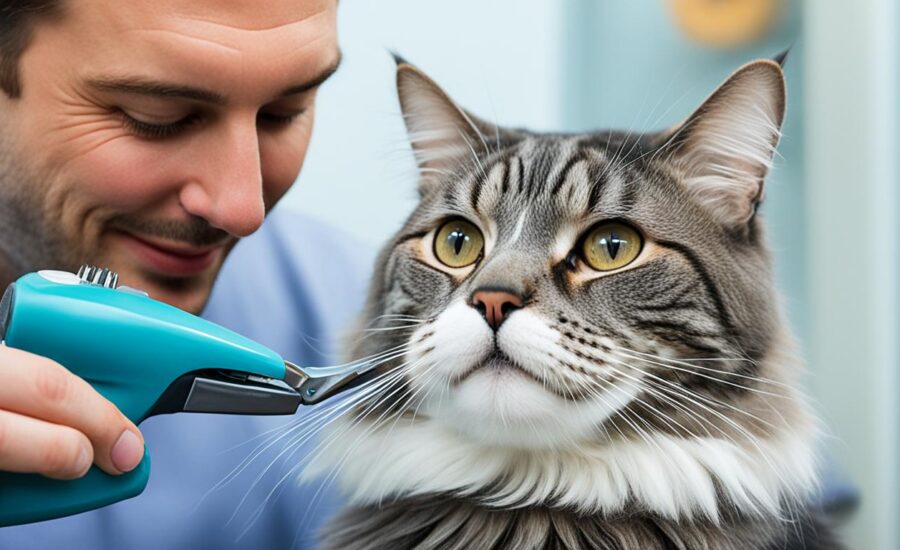Cat owners often picture a mess of fur and loud meows when thinking of grooming. But with the right stress-free grooming tips, keeping your cat clean and happy is easy. We’ve got practical grooming tips for cats that make the process less stressful. You’ll learn to pick the best tools and create a peaceful grooming spot. Our cat grooming advice will help you achieve perfect fur with each gentle brush. Discover how grooming can strengthen your bond and keep your pet healthy.
Key Takeaways
- Starting grooming sessions early in a cat’s life can significantly reduce grooming-related stress.
- High-quality grooming tools tailored to your cat’s coat type are essential for a comfortable grooming experience.
- Creating a tranquil environment with minimal noise and distractions aids in keeping your cat calm.
- Positive reinforcement with treats and praise can turn grooming sessions into eagerly anticipated events.
- Handling knots and mats with care and patience prevents discomfort and stress during grooming.
- Regular grooming is more than fur-deep; it’s an opportunity to check for potential health issues.
Understanding Your Cat’s Grooming Needs
Cat owners often forget how complex caring for a cat can be. Knowing your cat’s grooming needs is key to their health and joy. It’s more than brushing their fur; it includes caring for their overall well-being. With the right cat grooming tips and grooming hacks for cats, your pet can stay healthy. This also helps you grow closer to your furry friend.
The Importance of Regular Grooming for Cats
Regular grooming does more than make your cat look good. It checks for health problems too. A good grooming routine removes extra hair, cutting down on hairballs. It also spreads natural oils through their coat, making it shiny and sleek. Remember, grooming is vital for their health, not just for looks.
Detecting Common Cat Skin Problems During Grooming
When grooming your cat, watch for skin issues. Look for signs like too much scratching, bald spots, or odd bumps. Catching these signs early can help deal with problems that might be missed. Remember, stopping a problem before it starts is always best for your cat’s health.
Tools You’ll Need for Proper Cat Grooming
The right tools make cat grooming much easier. You need brushes and combs for their coat type, sharp nail clippers, and cat-safe shampoo. Choosing these tools carefully will make grooming better for you and your cat.
| Tool | Function | Coat Type |
|---|---|---|
| Brush | Removes loose fur, dirt, and stimulates skin | Short to Medium Hair |
| Wide-toothed Comb | Detangles and prevents matting | Long Hair |
| Nail Clippers | Trims claws to prevent overgrowth and splitting | All Types |
| Shampoo | Cleanses fur and skin without drying | All Types |
| Wipes | Quick clean-up and spot cleaning | All Types |
Using these grooming hacks for cats can make grooming fun instead of a chore. While grooming is key, it also lets you spot health issues. This might mean a trip to the vet. Keep your cat healthy with the right grooming.
Establishing a Grooming Routine Early On
Starting early is the key to stress-free grooming for your cat. It’s a big part of the 10 Tips for Stress-Free Cat Grooming Sessions. Getting your kitten used to grooming early helps them like it more as they grow. Here’s how to lay the groundwork for a grooming routine they’ll be okay with forever.
Start grooming when your cat’s calm, like after eating or when they’re sleepy. Doing it at the same times makes them feel safe and makes grooming a normal part of their day.
- Let them get to know the grooming tools by sniffing and playing with them. This reduces fear or aggression.
- Slowly mix grooming moves with petting, starting with gentle brushes. Always praise your cat for cooperating.
- Keep the first grooming sessions short so your cat isn’t scared off. Then, gradually make them longer as they get used to it.
- Use treats and love to make them see grooming as something good.
Be extra patient with older cats who aren’t used to grooming. Let them lead the way without pushing them too much. Short, regular sessions will help them get used to grooming without freak out. With time, grooming will just be part of their normal life, making it easier for everyone.
Grooming should never be a battle. It’s a chance to connect and care for your beloved pet.
Selecting the Right Grooming Tools and Techniques
For cat owners, it’s important to pick the right grooming tools. Good grooming advice helps keep your cat calm and makes the process work better. Let’s look at some key grooming tips that focus on choosing the best tools and techniques.
Choosing the Best Brushes and Combs for Your Cat’s Fur
Finding the right brush or comb for your cat is key. Metal combs are great for short fur and don’t pull the skin. Brushes for long-haired cats should gently untangle fur without hurting them. Using these tools regularly helps prevent mats and boosts skin health.
Proper Nail Trimming Practices
Cutting your cat’s nails needs patience and the right equipment. Make sure to avoid the quick to prevent pain and bleeding. Aim to trim the clear tip of the nail with cat nail clippers for a quick, safe cut.

Considering Cat-Safe Shampoos and Wipes
For a healthy coat and skin, use cat-approved shampoos and wipes. Avoid human products as they can be too harsh. Choosing the right grooming products is vital for your cat’s coat and skin health.
Creating a Calming Grooming Atmosphere
If you’re looking for stress-free grooming tips, start with the environment. A calm space is key for your cat’s comfort. The mood of the grooming area impacts how your cat reacts. It makes grooming a positive experience for both you and your pet.

Tips for Reducing Anxiety During Grooming Sessions
Lowering anxiety is crucial in grooming tips for cats. A calm setting helps reduce stress, making grooming peaceful. Some advice to improve the environment and ease worries includes:
- Choose a quiet room, away from the daily hustle and bustle, where your cat feels secure.
- Keep the grooming tools within reach but allow your pet to inspect them at their own pace to build familiarity.
- Implement an anti-skid mat for stability, which makes your cat feel in control.
- A soothing voice, gentle touch, and patient movements all contribute to a calmer grooming experience.
Using Scents and Sounds to Soothe Your Cat
Adding scents and sounds can help relax your cat. This approach creates a spa-like atmosphere for grooming. Here are suggestions to appeal to your cat’s senses:
- Sound: Soft, classical music or white noise can mask jarring ambient sounds and soothe your cat’s nerves.
- Scent: Mild natural fragrances, like lavender or chamomile, available through pet-friendly products can provide an olfactory cushion for stress.
- Ensuring the water temperature is lukewarm when required, as extreme temperatures can startle and upset your pet.
- Gentle, rhythmic petting synchronized with your cat’s natural purring rhythm can amplify the calming effect.
Using these methods in grooming strengthens stress-free grooming tips. It also builds a caring relationship between you and your cat. This turns maintenance into a nurturing act.
Positive Reinforcement and Trust Building Strategies
Introducing easy grooming tips into your routine does more than shine their coat. It makes your bond with your cat stronger. Grooming hacks for cats are not only about the tools and how to use them. It’s also how you connect with your cat during these times. Using positive reinforcement helps turn grooming into fun, loving moments.
Consistency is key in bonding through grooming. Giving your cat treats or playing after grooming teaches them it leads to fun. This helps them see grooming as something good, making future sessions easier.
Getting your cat used to the grooming space and tools is important. Let them check out the brushes and slowly introduce them to water if needed. Handling the tools gently and making a calm space for your cat to explore without pressure means less stress during grooming.
Remember, trust with your cat grows slowly. Stay patient and consistent with your grooming approach for a smoother routine.
Here’s a table to help you use reinforcement:
| Grooming Stage | Type of Reinforcement | Expected Benefit |
|---|---|---|
| Before Grooming | Allowing interaction with tools | Less fear of grooming tools |
| During Grooming | Treats and soft talk | Makes the cat calm and distracted |
| After Grooming | Playing or cuddle time | Makes grooming a positive experience |
Using these easy grooming tips does more than make your pet look good. It builds trust, and that’s invaluable in your journey together.
Strategies for Dealing with Difficult Areas
Making sure your pet is happy includes taking care of tricky grooming spots. Our cat grooming advice makes it easy to handle these areas. Use these grooming hacks for cats to keep your cat looking great without stress.
Grooming Sensitive Areas: Paws and Ears
Start by getting your cat used to having its paws and ears touched. Using unscented wipes can help clean these parts easily and comfortably. Be patient and gentle to avoid making your cat anxious during grooming.
Handling Matting and Knots Without Causing Stress
When you find tangled fur, a mat-splitter can be very helpful. It lets you untangle mats without causing pain. If your cat gets uneasy, pause and return later, keeping grooming laid-back.
Bathing without Battles: Making Water Less Fearsome
Not every cat likes water. But waterless shampoo or damp cloths can be a great alternative. They clean your cat without the need for a scary bath. A gentle spray mist might also offer a soothing experience for water-shy cats.
| Problem Area | Grooming Solution | Grooming Benefit |
|---|---|---|
| Paws and Ears | Regular handling, unscented wipes | Desensitization, reduces discomfort |
| Knots and Mats | Use of mat-splitter and fingers | Limits stress, prevents tugging |
| Fear of Water | Waterless shampoo, damp cloths, misting | Minimizes anxiety, accomplishes cleaning |
Conclusion
Working on improving cat care proves that patience and a gentle touch are key. Following our 10 Tips for Stress-Free Cat Grooming Sessions makes grooming fun for owners and cats. It’s crucial to keep sessions brief and use the right tools for your cat’s grooming needs.
Setting a calm space and using positive feedback greatly improves your cat’s grooming mood. This makes grooming less scary for your pet. By using these tips thoughtfully, grooming turns into a bonding time leading to a stronger connection with your cat.
Having a grooming routine without stress brings many benefits. It keeps your cat’s coat clean and them happy and healthy. By adopting these methods, see grooming as a way of showing your love and care for your pet.
FAQ
How often should I groom my cat?
What are some common cat skin problems I can detect while grooming?
Which tools are necessary for proper cat grooming?
How can I establish a stress-free grooming routine for my cat?
What type of brush is best for my cat’s fur?
How should I trim my cat’s nails without causing stress?
Can I use human shampoo on my cat?
How can I reduce my cat’s anxiety during grooming sessions?
Can scents and sounds really help soothe my cat during grooming?
What are some effective positive reinforcement techniques for grooming?
How should I groom sensitive areas like my cat’s paws and ears?
What’s the best way to deal with mats and knots in my cat’s fur?
Are there alternatives to traditional water baths for cats?
Source Links
- https://www.drmartybecker.com/wp-content/cache/wp-rocket/drmartybecker.com/fear-free/10-low-stress-tips-for-bathing-and-grooming-a-cat/index-https.html_gzip
- https://www.aspca.org/pet-care/cat-care/cat-grooming-tips
- https://medium.com/@aleemrajpoot619/top-10-tips-for-stress-free-cat-grooming-a124810d2cda

